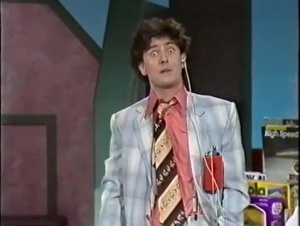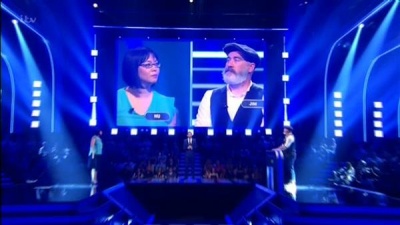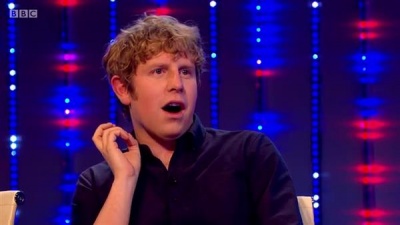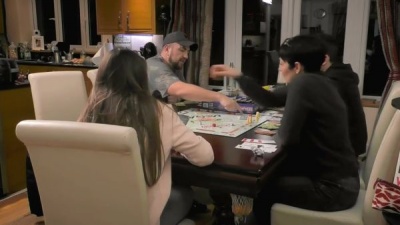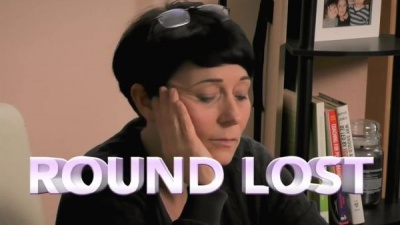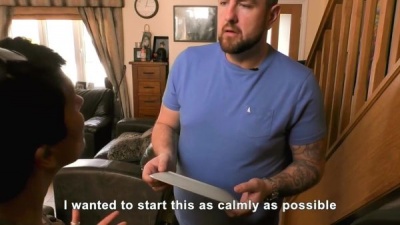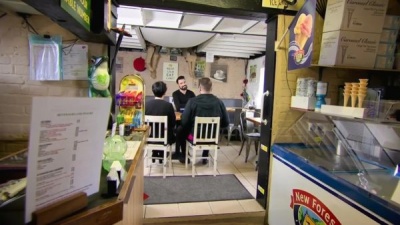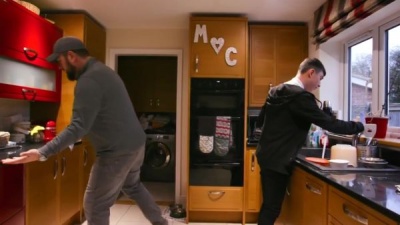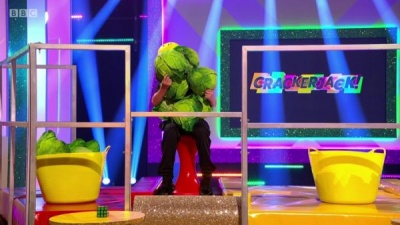Weaver's Week 2020-08-23
Last week | Weaver's Week Index | Next week
We were tickled to read a note on another wiki recently. It defined "game show" as "a reality/non-reality television show where contestants regularly compete for a reward".
After we'd stopped chortling, we wondered:
Contents |
What is a game show?
First point, it doesn't have to be a television show. It can be a radio programme (Just a Minute waves hello), it can be a stage show (Beat the Clock started as one), it can be something on the internet (see last week's Week).
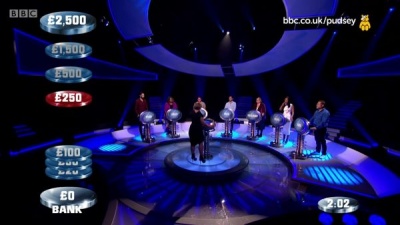 The Weakest Link: an example of a television game show.
The Weakest Link: an example of a television game show.
We've got no idea what a "reality or non-reality" programme is, as this seems to encompass everything in the universe. It's like saying the prog is "floopy or non-floopy", that definition helps nobody.
Compete for a reward? Not necessarily, though almost all shows with a prize are also game shows.
This column (and this site) is deliberately liberal in our definition of "game show". Some of the programmes we cover might not be game shows according to some commentators; they are at liberty to ignore our sterling work on The Shiny Show.
But what are the most common features of a game show?
1) It's intended for broadcast
The clue is in the name: specifically, the "show" part. The game you make must have non-playing spectators, remote from the action. If the only way to see your event is in the room, it's not being shown to anyone, and doesn't count as a game show. It can be a game, but it's got to be shown to be a show.
A game show doesn't have to be set in a studio, Survivor is clearly a contest done entirely outside. It doesn't have to be isolated from the rest of the world, Channel 4's Wanted and Hunted rely on the public phoning in their sightings.
So far as this column's concerned, all game shows have to be broadcast to an audience of at least one. If it's not broadcast somewhere, on some medium, it's not a game show.
2) The programme is primarily spontaneous and unscripted
The best way to explain the rules of a show is from a script. It can be as simple as "Get twenty questions wrong in a row", or as difficult as the rules to 500 Questions. In a quiz, the questions themselves will be scripted, but the responses are not.
Over at a comedy panel game show, we can allow a lot more leeway, as the emphasis is on "comedy" and "show". A certain amount of preparation is in order, the producers might let the panel think about what topics will be discussed, or even put forward places they'd like to steer the conversation towards. We have no ethical problem with that, as it makes for a better and funnier entertainment.
Some shows test the boundaries of this criterion. The ancient quiz Twenty-One tried to script both its questions and its answers, and succeeded. Twenty One both brought in high ratings, and high opprobrium when the rigged contest emerged.
More recently, pre-school programmes like The Shiny Show and Gigglequiz are wholly scripted, but conform to all of the other indicators of a game show. As they're educational, and properly charming, we'll list them.
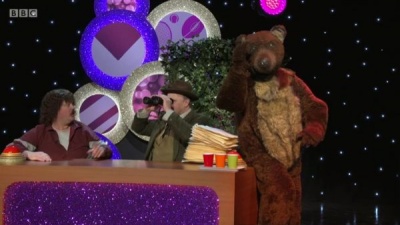 Rapids Johnson from Gigglequiz wonders where his tent is.
Rapids Johnson from Gigglequiz wonders where his tent is.
3) There's some sort of competition
Rules, that's what this genre needs. Not rules for inclusion, but a structure within each show. It's put in place by the producers, it shapes the actions of participants, until the end result is determined.
The competition can be between players, judged objectively by their performance within the programme's tasks. Answers in a quiz, or being able to push Atlaspheres over their pods.
 The Circle: an example of an internally-competitive television game show.
The Circle: an example of an internally-competitive television game show.
Or the competition can be between players, judged subjectively. In turn, that judgement can be internal to the programme cast (as on The Circle) or from viewers (as on Big Brother) or from an expert panel (as on The Incredible Spinning Chairs bit of The Voice).
Or the competition can be against the producers – either directly, as on Deal or No Deal, or indirectly, as through their machine on Tipping Point.
The contest can be tightly structured, like on The Chase. Or it can be a loose framework to test ingenuity, as we saw on The Button and Masterchef.
 Bake Off: timed, cooking to a set criterion.
Bake Off: timed, cooking to a set criterion.
However it's done, there is a set of rules to govern the event. We don't think we list a show without any structure.
4) There's a way to win, or a way to lose, or have some sort of result
Even a comedy panel game has a victory or defeat. Points are awarded, often on an arbitrary and capricious basis, and a winner is declared. Josh Widdicombe and/or Katherine Ryan, usually.
Your typical quiz has plenty of losers, and only one winner. Your typical cookery show has plenty of losers, and only one winner. A prize might be attached to the victory, but there are many game shows where the only reward is honour and bragging rights.
On shows like Time Commanders, where it's one player against the house, the team can win or can lose against predetermined metrics. Deal or No Deal didn't have many clear-cut winners or losers, and there had to be some exceptionally complex metrics devised to determine the outcome of a game, and some debate about whether these were the best descriptors.
Some programmes will have the form and appearance of a game show, but never reveal the points. Samantha, the scorer on Radio 4's I'm Sorry I Haven't a Clue, has been keeping it buttoned up since 1985.
5) It's not a recognised sport
The only negative criterion in our list, and it's hard to define. Our working definition: "would this athletic or mechanical event attract a paying crowd even if it wasn't on television?"
Sport involves athletic endeavour, people running or jumping or kicking balls or throwing projectiles. Sport also covers mechanical endeavours, involving bicycles and cars and lorries and Gatling guns.
It may be that we need to see the show before reaching a conclusion. Caffeinated Cartie Challenge from Alexandra Palace has popped up on UKTV's Dave channel, and we eventually concluded this was a sports event. While there is a contest (get to the bottom of the hill as fast as you can), the event isn't made specifically for television, and it could attract a paying crowd along the route. The clincher was in the tone of the coverage: serious and concentrating on speed, like Formula One events, and not light and whimsical like Gods of the Game, nor concentrating on the story like on Scrapheap Challenge.
Being brought up in the art and craft of descriptive regulations, we consider each programme on its merits, and reach a considered decision about whether it is a game show. Different people will come up with a different definition, and part of the charm is arguing whether Caffeinated Cartie Challenge does pass as a game show. We don't have a specific set of criteria, there's no magic algorithm to produce an A-standard result.
There is, however, one final exemption:
99) The show insists it's a game show
Programmes, like people, may define themselves however they wish. If a programme insists it is a game show, both in its publicity and to its participants, then we will treat it as a game show. We will give it a listing in the A-Z, and consider it for further review.
This can be a double-edged sword.
It Pays to Behave
Primal Media (an STV Productions Company), 24 July
Over the past ten years or so, there's been a strand of Channel 4 lifestyle programmes with a snide undertone, showing lives so that other people can sneer at them. Programmes like Benefits Street, How to Clean Your Hovel, and Love Thy Neighbour were documentaries of dubious honesty, shown so that Channel 4's preferred upper-middle-class viewers could feel more smug.
The trend started with Supernanny in the early aughts. More recently, Channel 4 has returned to how children might be raised. The shouty show Britain's Best Parent? pretended to show different styles of parenting, but the mass debate afterwards proved it only reinforced the audience's prejudices. It Pays to Behave, though commissioned almost two years ago, went out last month.
It Pays to Behave featured a family in Portsmouth. The parents know they're going to be set challenges, and meeting these challenges will win them money. The three teenage children know they're being filmed for a documentary, but not that there are cash rewards involved. So the first challenge, "can the parents be bribed to keep a secret from their children?"
The tasks are simple to explain. Get the children out for school on time. Spend an evening without using screens. Pay each child an honest compliment. Take a family outing together.
These tasks are harder to achieve. For example, when challenged to spend an evening without using screens, what do they propose? Turning off all the power in the house so that everyone has to sit and read in the living room? A spontaneous night out at a swish restaurant, one that – gosh! – doesn't allow any mobile phones?
"We thought we'd play a game."
OK, that's a good idea. What have they got? Pandemic? Civilisation? Game of Wolf? Something exciting and engrossing to last the evening?
This is as successful as you'd expect.
There are two generations in this house
"They're rude, they're grumpy, they're frustrated," complain the parents about their children. What do the children think about their parents? Being 13 to 16, the younger members of the family will have some things to say, but their views are marginalised throughout: this is a programme about the parents.
As the programme goes on, two things become clear. One, the father of the household shouts a lot. As soon as the contest introduces a "no shouting" rule, and father sticks to it, much of the tension in the house dissolves away.
Two, the mother and father are in a relatively new relationship, and have brought their children into that relationship. The children from one parent are surprised at how fast things have gone, and we get the clear impression that they're still missing their other parent. The reasons behind this are not explored on screen; it's unclear if they've been explored by the people involved.
At one point, host Rylan Clark-Neal meets with the parents in a cafe, and shows them footage contributed by the children. We're slightly queasy about including footage from the children like this, it raises questions about ethics.
Remember, the children have been deliberately kept in the dark about the nature of the project. Does that mean they can meaningfully consent to having their contributions used this way? We can see an argument that the children knew that they were giving these pieces to a camera, and with the expectation that they would be shown to the parents eventually. It's legal, but we're not convinced that it's kosher. The producers' actions are just, they're in accordance with the letter of the television code. But perhaps not fair, it certainly leaves us feeling uncomfortably like voyeurs.
As a sidebar, we strongly suspect that there were more meetings like this one in the cafe, more support and help available to the parents, but not shown for reasons of time. Indeed, this whole programme feels like a two or three episode series, compressed down into one hour and thrown out when no-one's watching.
"The nuclear family is a tool of repression" – A. N. Sociologist
Ultimately, It Pays to Behave idealises a particular view of the family unit. It encourages people who share activities and do things together. Folk who are punctual. It wants children to be as obedient to their parents as they are independent people. Throughout, the programme insists that the parents impose their wants and desires on the children, and over-ride the child's wants and desires.
It Pays to Behave is predicated on that final word, "behave". Adhere to social norms. Act in a "proper" manner, one that won't embarrass the parents. In this example show, the parents want their children's undivided attention at a time of the parents' choice. The parents force the outcome they desire, and are rewarded for it. At no point does anyone stop to ask, is this good for the children? Have they enjoyed the experience, would they repeat it?
At one point, one of the parents says, "Two separate families living in one house: that isn't good for our relationship, and that isn't healthy for the kids." How did this arise?
If there is damage to the children's psyches, might that have been a result of all the change in recent years – having one parent move out, then a replacement move in, and bringing an extra head into the house? The young adults in this house are between 13 and 17. They're old enough to make decisions about their own lives. For one segment, the parents are bribed to invade their child's personal domain (their room) and their personal space, with scant regard to the young person's consent or lack thereof. Does the fact of being a parent void the message not to touch other people without permission?
But to return to "Two separate families living in one house: that isn't good for our relationship, and that isn't healthy for the kids." As they're fond of writing in another wiki, "citation needed". It would be an unconventional arrangement, but unconventional doesn't necessarily mean wrong. It means different, unusual, perhaps difficult. It risks curious comments from the neighbours, and attracts gossip.
And that's why we class It Pays to Behave alongside all the other curtain-twitching documentaries Channel 4 has made over the years. We're asked to sit in judgement about a group of people we've never met before, and probably won't meet again. Three of them are being lied to. The other two are being bribed to modify their own behaviour, in ways that would be egregious in any other context, and in the hope that they'll steer the group in the direction they want to go in. The whole thing leaves us spitting feathers.
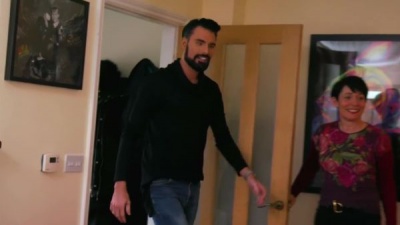 Rylan Clark-Neal comes into the living room.
Rylan Clark-Neal comes into the living room.
Ultimately, this is a column about game shows. As a game show, It Pays to Behave was completely run-of-the-mill. It didn't stretch the boundaries of television, it didn't explore new ground. By no means was it a technical failure, the programme was perfectly watchable. It fits directly into Channel 4's regrettable strand of morally superior documentaries.
As a social experiment, we fear the programme is a failure: it asked lots of questions, and left them begging for an answer. Not least, what happened to the family afterwards? And, who chose to air this guff, rather than all those episodes of The Crystal Maze they've got propping up the Channel 4 drinks cabinet?
In other news...
A good article from Wiwiblogs, on how AVROTROS got to win the Eurovision Song Contest. Compare, if you will, with our early thoughts from May 2019.
Great news for all viewers, as BBC Children's are making another series of Crackerjack!. Children who want to appear – and parents who are happy to be gunged – will want to head to the CBBC website.
We plan to look at Stephen Mulhern's Rolling in It in the next Week.
Photo credits: BBC, Wall to Wall, Studio Lambert and Motion Content Group, Love Productions, 12 Yard / Black Dog, Granada, Primal Media, BBC Childrens.

